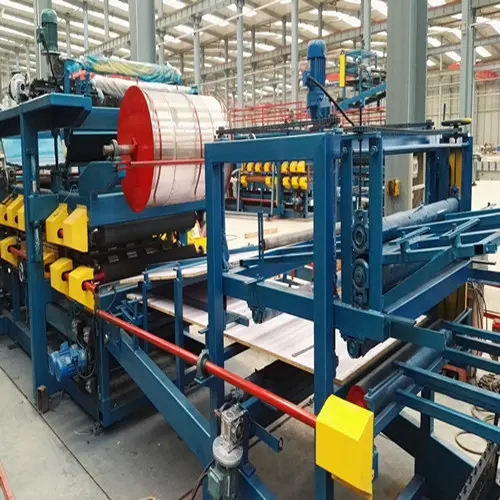
Understanding Roofing Sheet Making Machines Transforming Materials for a Stronger Future
In the construction industry, roofing sheets play a vital role in ensuring the durability, strength, and efficiency of buildings. As demand for high-quality roofing materials continues to rise, the need for advanced roofing sheet making machines has become increasingly important. These machines not only facilitate the production process but also significantly enhance the quality and variety of roofing sheets available in the market.
What are Roofing Sheet Making Machines?
Roofing sheet making machines are specialized equipment designed to manufacture various types of roofing sheets from metal or other materials. These machines typically work by feeding raw materials, such as galvanized steel or aluminum, through a roll forming process. The machines use a series of rollers to shape and profile the sheets into their final form, which can range from corrugated to tile-like designs.
The process starts with a coil of metal, which is unwound and fed into the roll forming machine. As the coil passes through multiple sets of rollers, it is gradually shaped into the desired architectural profile. After being formed, the sheets are cut to size and can be further processed with additional treatments such as painting or coating to enhance their corrosion resistance and aesthetic appeal.
The Benefits of Using Roofing Sheet Making Machines
1. Efficiency and Speed Roofing sheet making machines are designed for high production rates, allowing manufacturers to produce large quantities of roofing sheets in a relatively short amount of time. This efficiency is crucial for meeting the demands of construction projects, especially during peak seasons.
2. Cost-effectiveness By automating the production process, roofing sheet making machines help reduce labor costs and minimize material waste. The precise cutting and forming processes ensure that materials are utilized optimally, resulting in cost savings for manufacturers.
3. Customizability Modern roofing sheet making machines can be easily adjusted to produce a wide range of sheet profiles and thicknesses. This versatility enables manufacturers to cater to specific customer requirements and adapt to evolving market trends.

4. Quality and Durability The high-tech nature of these machines ensures the production of roofing sheets that meet stringent quality standards. The use of advanced materials and coatings enhances the lifespan and durability of roofing sheets, contributing to better overall performance in various weather conditions.
5. Sustainability Many manufacturers are increasingly focusing on the sustainability aspect of their production processes. Roofing sheet making machines are often designed to minimize waste and energy consumption. Furthermore, the use of recyclable materials in the production of roofing sheets contributes to a more sustainable construction industry.
Types of Roofing Sheet Making Machines
There are several types of roofing sheet making machines available in the market, each designed for specific applications. Some of the most common types include
- Corrugated Sheet Making Machines These machines produce corrugated roofing sheets, which are widely used due to their strength and lightweight properties. The corrugated design provides excellent drainage and is ideal for areas prone to heavy rainfall.
- Tile Profile Sheet Machines Designed to create tile-like roofing sheets, these machines cater to homeowners and builders looking for aesthetically pleasing options. The tile profile not only enhances the visual appeal of buildings but also provides excellent insulation.
- Double Layer Roofing Sheet Machines These machines can produce two different profiles simultaneously, allowing manufacturers to offer diverse product options without the need for multiple machines. This feature is particularly beneficial for businesses looking to maximize efficiency and productivity.
Conclusion
Roofing sheet making machines are an essential component of the modern construction industry. Their ability to produce high-quality, cost-effective roofing materials efficiently helps builders and manufacturers meet the ever-increasing demands for residential and commercial projects. As technology advances, we can expect further innovations in roofing sheet production processes, making them even more sustainable and adaptable to future needs. Investing in these machines not only ensures a competitive edge in the market but also contributes to the development of robust and resilient infrastructures.